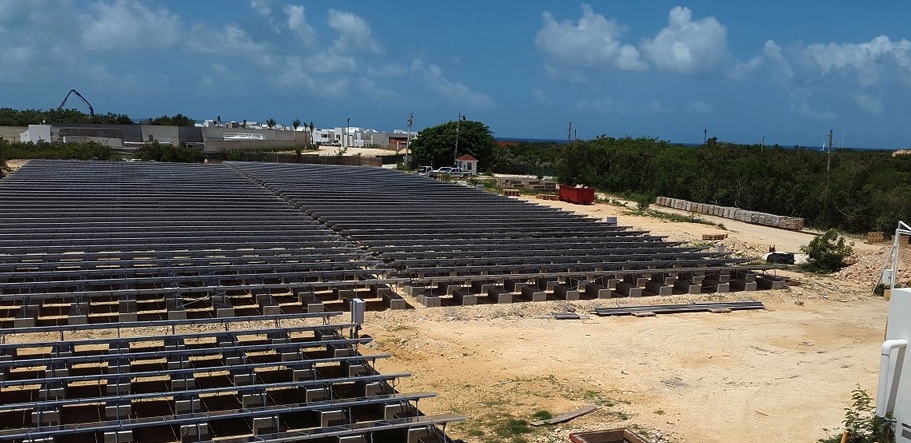Strapped with both water and energy crises, several island nations are investing in solar-powered water plants to attain more resilient water and power sources, according to executives of a major international resort chain.
One of the latest examples is the CuisinArt Golf Resort & Spa’s new installation in Anguilla, an island in the British West Indies east of Puerto Rico. The innovative solar generation system powers the resort’s reverse-osmosis water plant, and it is seen as a model for similarly situated Caribbean islands and hospitality operators.
Working with GE and Inovateus Solar, a South Bend, Ind.-based photovoltaic system developer, CuisinArt, installed its own 1.0-MW solar power generation plant with a battery backup system to store energy. In this way, says Rory Purcell, the resort’s chief engineer, the off-grid plant will provide an uninterruptible energy supply for the reverse-osmosis (RO) water treatment system.
The RO plant filters and desalinates supply water, creating potable “solar water” to the residents on the island, guests of the resort and irrigation water for the golf course, says Purcell.
The project—designed and constructed by CuisinArt and Inovateus with the contractors SwitchLogix and PDE Total Energy Solutions—has been designed in such a way that it is completely isolated from the grid. It also has the unique benefit of being able to reconnect partial loads, in a discretionary way, to continue to desalinate outside solar production hours. For those hours when the sun is down, it depends on the local utility, Anguilla Electricity Company Ltd.
Anguilla recently joined the group Carbon War Room’s Ten-Island Challenge to reduce the Caribbean’s carbon footprint, and the CuisinArt plant is the first major foray into renewables for the island. The new solar plant saves 1.2 million pounds of carbon dioxide emissions annually, says Inovateus executive Peter Rienks. “The payback on this project will immediately save CuisinArt hundreds of thousands of dollars per year. Even more important, it provides a solution to the global water crisis,” he explains. “This system could be duplicated on any island in any country around the world.”
According to CuisinArt’s Purcell, the initiative is both viable and secure. “It is a proven strategy to penetrate the national demand with renewable energy far in excess of the usual grid-tied limits,” he says. PV is a low “environmental impact source, designed to withstand Category 5 hurricanes, low-flying objects and poorly directed golf balls,” he chuckles. “It has low maintenance requirements with a life expectancy in excess of 25 years.”
The new solar array supports the plant’s daily capacity of 1.25 million gallons of fresh water, which serves the 130-key resort and its Greg Norman Signature Golf Course, as well as the new 80-key Reef Hotel, an associated spa and six full-service restaurants. CuisinArt also operates hydroponic and organic farms, a 500,000-square-foot residential estate, and -- of course -- an extensive irrigation system.
“CuisinArt has set a sustainable precedent for photovoltaic water purification throughout the world,” says Peter Foss an executive with GE. “Not only will the project have a great return on investment, it will also help reduce the island’s dependence on fossil fuels and help create a cleaner environment for generations to come.”
Related Stories
| Dec 17, 2013
Nation's largest net-zero K-12 school among winners of 2013 Best of Green Schools award
The Lady Bird Johnson Middle School in Irving, Texas, was named a winner of USGBC's annual award, along with nine other schools, individuals and communities working toward the common goal of healthy, high-performing learning places.
| Dec 16, 2013
Irving, Texas building state’s second net-zero school
Lee Elementary School, scheduled to open in fall 2014, will be net-zero-ready, and if the school board decides to sell district bonds and allow the purchase of additional solar panels, will be a true net-zero facility.
| Dec 10, 2013
16 great solutions for architects, engineers, and contractors
From a crowd-funded smart shovel to a why-didn’t-someone-do-this-sooner scheme for managing traffic in public restrooms, these ideas are noteworthy for creative problem-solving. Here are some of the most intriguing innovations the BD+C community has brought to our attention this year.
| Dec 9, 2013
What is life cycle cost optioneering?
Life cycle cost optioneering is a way of assessing alternative design options, analyzing their long-term capital and operational costs to identify those with the lowest price tag, over the entire life cycle.
| Dec 9, 2013
Skaneateles, N.Y., converts old firehouse to net-zero village hall
The Finger Lakes village of Skaneateles, N.Y., renovated its vacant firehouse into Skaneateles Village Hall, the first municipal net-zero energy building in the state of New York.
| Dec 2, 2013
Security is key component of Army’s net-zero assessment strategy
For the U.S. Army, creating secure sources of energy is an important driver for its net zero goals. Critical military missions are at a high risk of failure in the event of an electric grid failure, according to a Defense Science Board report.
| Nov 27, 2013
LEED for Healthcare offers new paths to green
LEED for Healthcare debuted in spring 2011, and certifications are now beginning to roll in. They include the new Puyallup (Wash.) Medical Center and the W.H. and Elaine McCarty South Tower at Dell Children’s Medical Center of Central Texas in Austin.
| Nov 27, 2013
University reconstruction projects: The 5 keys to success
This AIA CES Discovery course discusses the environmental, economic, and market pressures affecting facility planning for universities and colleges, and outlines current approaches to renovations for critical academic spaces.
| Nov 25, 2013
New California codes moving state toward net-zero requirements
Under the new Title 24, all new residential construction must be net zero by 2020, with all new commercial buildings achieving this goal by 2030.
| Nov 22, 2013
Health Product Declaration Collaborative to develop protocol for third-party verification of HPDs
Seven leading product sustainability assessment companies partner with the HPD Collaborative to develop the verification and quality assurance protocols.

















